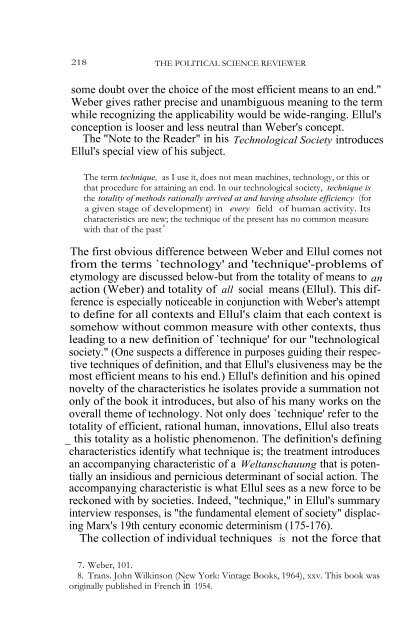Jacques Ellul- Prophetic or Apocalyptic Theologian of Technology?*
Jacques Ellul- Prophetic or Apocalyptic Theologian of Technology?*
Jacques Ellul- Prophetic or Apocalyptic Theologian of Technology?*
Create successful ePaper yourself
Turn your PDF publications into a flip-book with our unique Google optimized e-Paper software.
218 THE POLITICAL SCIENCE REVIEWER<br />
some doubt over the choice <strong>of</strong> the most efficient means to an end."<br />
Weber gives rather precise and unambiguous meaning to the term<br />
while recognizing the applicability would be wide-ranging. <strong>Ellul</strong>'s<br />
conception is looser and less neutral than Weber's concept.<br />
The "Note to the Reader" in his Technological Society introduces<br />
<strong>Ellul</strong>'s special view <strong>of</strong> his subject.<br />
The term technique, as I use it, does not mean machines, technology, <strong>or</strong> this <strong>or</strong><br />
that procedure f<strong>or</strong> attaining an end. In our technological society, technique is<br />
the totality <strong>of</strong> methods rationally arrived at and having absolute efficiency (f<strong>or</strong><br />
a given stage <strong>of</strong> development) in every field <strong>of</strong> human activity. Its<br />
characteristics are new; the technique <strong>of</strong> the present has no common measure<br />
with that <strong>of</strong> the past e<br />
The first obvious difference between Weber and <strong>Ellul</strong> comes not<br />
from the terms `technology' and 'technique'-problems <strong>of</strong><br />
etymology are discussed below-but from the totality <strong>of</strong> means to an<br />
action (Weber) and totality <strong>of</strong> all social means (<strong>Ellul</strong>). This difference<br />
is especially noticeable in conjunction with Weber's attempt<br />
to define f<strong>or</strong> all contexts and <strong>Ellul</strong>'s claim that each context is<br />
somehow without common measure with other contexts, thus<br />
leading to a new definition <strong>of</strong> `technique' f<strong>or</strong> our "technological<br />
society." (One suspects a difference in purposes guiding their respective<br />
techniques <strong>of</strong> definition, and that <strong>Ellul</strong>'s elusiveness may be the<br />
most efficient means to his end.) <strong>Ellul</strong>'s definition and his opined<br />
novelty <strong>of</strong> the characteristics he isolates provide a summation not<br />
only <strong>of</strong> the book it introduces, but also <strong>of</strong> his many w<strong>or</strong>ks on the<br />
overall theme <strong>of</strong> technology. Not only does `technique' refer to the<br />
totality <strong>of</strong> efficient, rational human, innovations, <strong>Ellul</strong> also treats<br />
_ this totality as a holistic phenomenon. The definition's defining<br />
characteristics identify what technique is; the treatment introduces<br />
an accompanying characteristic <strong>of</strong> a Weltanschauung that is potentially<br />
an insidious and pernicious determinant <strong>of</strong> social action. The<br />
accompanying characteristic is what <strong>Ellul</strong> sees as a new f<strong>or</strong>ce to be<br />
reckoned with by societies. Indeed, "technique," in <strong>Ellul</strong>'s summary<br />
interview responses, is "the fundamental element <strong>of</strong> society" displacing<br />
Marx's 19th century economic determinism (175-176).<br />
The collection <strong>of</strong> individual techniques is not the f<strong>or</strong>ce that<br />
7. Weber, 101.<br />
8. Trans. John Wilkinson (New Y<strong>or</strong>k: Vintage Books, 1964), xxv. This book was<br />
<strong>or</strong>iginally published in French in 1954.
















